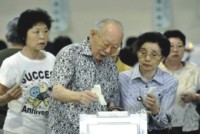International
Change in Japan?
Think again
William Choong
 |
The winning candidate Yukio Hatoyama. |
The concept of 'change' is a fine instrument of warfare in politics. In 2007, Australian Prime Minister Kevin Rudd employed it successfully to defeat a government which had been in power for 11 years. A year later, US President Barack Obama used the same tactics in winning the presidential race.
Last week, Democratic Party of Japan (DPJ) leader Yukio Hatoyama hailed his party's historic victory over the Liberal Democratic Party (LDP), which has ruled Japan for an almost uninterrupted 55 years, as a change amounting to a 'revolution'.
The DPJ has proposed a long list of changes: the power of Japan's massive bureaucracy would be curtailed; the interests of ordinary Japanese would not be subverted by big businesses; social welfare would be boosted. The most disturbing proposal, however, is the DPJ's threat to recast Japan's alliance with the United States - an arrangement that has undergirded Asia-Pacific security for decades. Among the DPJ's demands: revising a bilateral agreement that governs how US troops in Japan are treated; blocking refuelling operations by the Maritime Self-Defence Force (MSDF) in the Indian Ocean in support of anti-terrorism missions; opposing a US-Japan agreement on relocating Marine bases in Japan.
On the issue of US-Japan relations, Hatoyama has been remarkably consistent. In a 1996 article titled A Security Treaty Without Stationing Troops During Peacetime, he acknowledged the importance of the US-Japan relationship, but called for the removal of US forces from Japan by 2010. In recent campaigning, he called for a more 'equal' relationship with Washington.
The reality, however, is that few, if any, of the DPJ's demands will be met. It was fashionable to argue during the Cold War that the alliance was not built for fighting wars. Its unspoken goal was to keep US forces present in Japan and East Asia. The 'paper alliance' was run from desktops and filing cabinets, by up to a dozen military officers.
Now, however, the alliance has been transformed. Since 2001, the MSDF has provided logistical support to coalition forces engaged in Operation Enduring Freedom. Japanese forces have participated in reconstruction missions in Iraq. In 2005, the US and Japan triggered the ire of China after they designated Taiwan to be an area of mutual security concern. In the Defence Policy Review Initiative of 2006, both countries integrated their forces further by enabling the US to utilise Japanese bases.
Moreover, the geopolitics of Japan's immediate neighbourhood call for a more assertive military. North Korea's nuclear arsenal has triggered much concern in Japan, and China's military development is also worrying. No wonder then that in a recent poll, more than three-quarters of Japanese - the highest level in 30 years - said that the US alliance was useful.
 Dr Michael Green, formerly an adviser to then president George W. Bush, says there is little to worry about in the DPJ's demands. He claims a deputy of DPJ leader Ichiro Ozawa told him the party's demands were offered to "appease the left wing of the party and raise the political cost for the LDP". Dr Michael Green, formerly an adviser to then president George W. Bush, says there is little to worry about in the DPJ's demands. He claims a deputy of DPJ leader Ichiro Ozawa told him the party's demands were offered to "appease the left wing of the party and raise the political cost for the LDP".
Dr Green, now the Japan Chair at the Washington-based Centre for Strategic and International Studies, argues that Japan's 'reluctant realism' will not change in the long term. The DPJ "could try to revise core aspects of the alliance and risk all its political capital in a fight with the US; or it could modify its foreign policy promises and focus on economic policies that would give them a strong base to compete in next year's Upper House election", he wrote.
The policies where the DPJ can actually effect real change are in non-security-related areas: the ailing economy, unemployment, pensions and a fraying social safety net. But even in these areas, its policies remain inchoate. And where they are not, its policies will still have to go through the country's army of bureaucrats.
Wisely enough, the DPJ has declared that it would deploy 100 lawmakers in various ministries to claw back power from the country's 360,000 bureaucrats. The problem here, however, is that the DPJ scrapped an LDP-sponsored civil service reform bill. The bill sought to replace the mandarins with an army of political appointees.
And while the mandarins are hinting that they would cooperate, their recent statements appear to evoke Sir Humphrey Appleby, the fictional civil servant of Yes, Prime Minister fame who stalled, confused and coerced his prime minister. At a recent news conference, Yasutake Tango, the top finance ministry official, said he was ready to follow instructions from a new government, adding: "We must work appropriately if a new government has a new policy."
The salient word here is "if". Tango might well have been channelling Sir Appleby, who used to avoid proposed reforms by declaring that "the question of administrative policy can cause confusion between the policy of administration and the administration of policy".
In short, little change will come out from the DPJ's declarations about radical change. The politics of change do not always result in a change of policy.
Copyright
(R) thedailystar.net 2009 |
